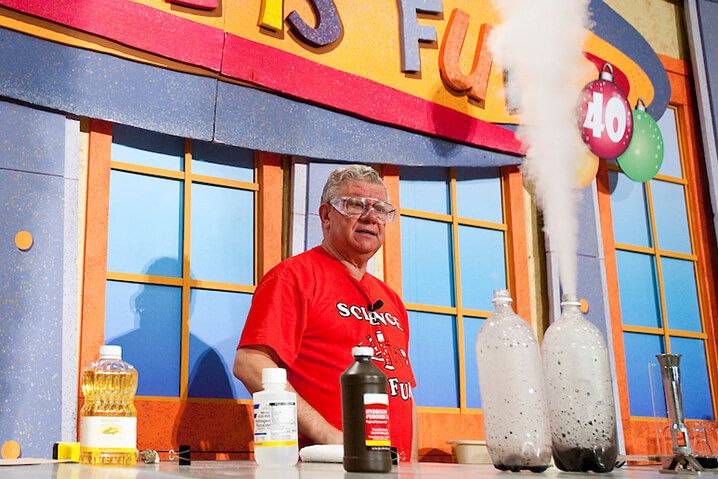Have you ever put a blindfold on and tasted assorted jelly beans? Can you tell what color they are based on the flavor? It’s a test of the correlation between taste and smell.
You could build your own electric motor using wire, magnets, and batteries. Or use a few household chemicals to make frothing, foaming, fizzing liquids that overflow their containers.
For generations, Bassam Shakhashiri has entertained people of all ages with his homemade science experiments. On his website, scifun.org, there are myriad examples of fun things just like those that people can do. Earlier this month, children and families gathered, as they have for five decades, to embrace the fun of science experiments at his live show, “Once Upon a Christmas Cheery in the Lab of Shakhashiri.”
But this year is about more than just 50 years of fun and games. The urgency of now resonates with Shakhashiri. Science is not just curiosity about the world and how things work. There are high stakes, too. The earth is going through changes — subtle but violent — that are the result of the way humans have chosen to live. Yet not enough people, especially in positions of power, are taking the matter seriously.
“Global warming is unequivocal,” Shakhashiri says. “There is no doubt that it is happening. It is going to continue to happen, and it’s going to affect the people who deny it. I am interested in the steps it takes to mitigate climate change. I say mitigate because we can’t stop climate change. The industrial revolution has produced more carbon dioxide than ever before. So we have to look at the social dimensions, the political ramifications of the actions we take, and if people engage in respectful discourse, then we can make progress.”
Shakhashiri says mitigating the effects of climate change include doing things like taking better responsibility for the foods we eat, for how we transport ourselves, and for the quality of water around us. Most of all, he says, we have to reduce our dependence on fossil fuels as a source of energy.
“We should have respectful conversations with each other about the economic benefits versus economic consequences,” he says. “That’s what my effort really is all about. … We must engage in civic discourse with each other and with our elected officials. It’s the most daunting challenge in human history.”
Shakhashiri grew up in Lebanon and migrated to the United States as a teenager. From childhood, he was fascinated by scientific principles and questions.










